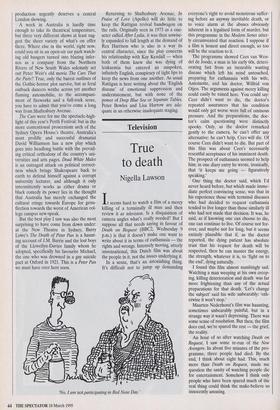Television
True to death
Nigella Lawson
t seems hard to watch a film of a mercy killing of a terminally ill man and then review it as television. Is a disquisition of camera angles what's really needed? But I suppose all that needs saying in favour of Death on Request (BBC2, Wednesday 9 p.m.) is that it doesn't make one want to write about it in terms of euthanasia — the rights and wrongs. Intensely moving, utterly unsensational, this Dutch film was about the people in it, not the issues underlying it. In a sense, that's an astonishing thing. It's difficult not to jump up demanding 'No, I am not participating in Red Nose Day.' everyone's right to avoid monstrous suffer- ing before an anyway inevitable death, or to voice alarm at the abuses obviously inherent in a legalised form of murder, but this programme in the Modern Series utter- ly circumvented that reaction. I suppose if a film is honest and direct enough, so too will be the reaction to it.
The programme showed Cees van Wen- del de Joode, a man in his early 60s, deteri- orating fast from an incurable wasting disease which left his mind untouched, preparing for euthanasia with his wife, Antoinette, and his doctor, Wilfrid von Oijen. The arguments against mercy killing could easily be raised here. You could say: Cees didn't want to die, the doctor's repeated assurances that his condition would only get worse were full of ominous pressure. And the preparations, the doc- tor's calm questioning were distinctly spooky. Only, as the doctor remarked gently to the camera, he can't offer any alternative: he can't help, Cees will die. Of course Cees didn't want to die. But part of this film was about Cees's necessarily resentful acceptance of his imminent death. The prospect of euthanasia seemed to help him; in one diary entry he wrote, ironically, that 'it keeps me going — figuratively speaking.'
One thing the doctor said, which I'd never heard before, but which made imme- diate perfect convincing sense, was that in his experience those with terminal diseases who had decided to request euthanasia tended to live longer than those similarly ill who had not made that decision. It was, he said, as if knowing one can choose to die, one can continue to live. Of course not for- ever, and maybe not for long, but it seems entirely plausible that if, as the doctor reported, the dying patient has absolute trust that his request for death will be respected, then he can muster the energy, the strength, whatever it is, to 'fight on to the end', dying naturally.
I found this film almost numbingly sad. Watching a man weeping at his own creep- ing, killing deterioration and death was far more frightening than any of the actual preparations for that death. 'Let's change the subject' said his wife unbearably: 'oth- erwise it won't stop.'
Maarten Nederhorst's film was haunting, sometimes unbearably painful, but in a strange way it wasn't depressing. There was some sense of resolution. But then, the film does end, we're spared the rest — the grief, the reality.
An hour of so after watching Death on Request, I saw some re-run of the New Avengers. In about five minutes of the pro- gramme, three people had died. By the end, I think about eight had. This, much more than Death on Request, made me question the sanity of watching people die for entertainment. Somehow I think only people who have been spared much of the real thing could think the make-believe so innocently amusing.


























































 Previous page
Previous page